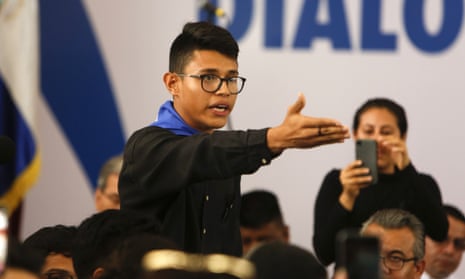Nicaraguan police have arrested a half dozen more opposition figures, including the sixth presidential hopeful to have been detained in a crackdown that started last month.
Among those arrested on Monday was Lesther Alemán, a former student leader who returned to Nicaragua after exile but stayed in safe houses. Those detained also included the presidential contender Medardo Mairena and Max Jerez, another student leader.
Two leaders of farmers’ groups, Pedro Mena and Freddy Navas, were also arrested, and a third, Pablo Morales, was listed by opposition activists as having been detained.
Almost all were arrested under “treason” laws that President Daniel Ortega has used to detain almost all his potential rivals in the 7 November elections.
On Tuesday, the European Union’s top diplomat, Josep Borrell, said that “more restrictive” measures may be needed against Ortega’s Sandinista regime.
“The situation has reached such an extreme that member states will have to study more concrete actions, and not just ‘enough already, Mr Ortega,’” Borrell told a session of the European Parliament.
Alemán played a leading role in 2018 protests against Ortega’s government that were met with brutal repression; he went into exile in the United States after that and knew he might be a target when he returned in 2019. Alemán hadn’t lived at home for three years.
Alemán’s relatively new Citizens for Freedom party has not selected its candidate yet, but Alemán had said last week he planned to run.
The government has arrested at least 27 opposition figures over the past month. Most face vague allegations of crimes against the state. Ortega alleges the April 2018 street protests were part of an organized coup attempt with foreign backing.
Alemán rose to fame in May 2018, a month after the huge protests erupted and paralyzed much of the country before being violently put down. At the first attempt at dialogue with Ortega, Alemán shocked those watching the live televised event.
“This is not a table of dialogue. This is a table to negotiate your exit and you know it well,” he told the president. “Give up!”
Some had said previously that opposition figures like Alemán and Mairena should not dignify the marred elections by participating. With five of the best-known potential candidates already in jail and the field tilted heavily in Ortega’s favor as he pursues a fourth consecutive term, some believe the opposition should sit out and not legitimize an Ortega victory.
But in the case of Alemán and Mairena, Ortega solved that dilemma by tossing them, too, in jail, where political prisoners are mostly held in secret locations, incommunicado, with no access to relatives or lawyers.
Candidates must register by 2 August. Two other potential candidates from Alemán’s party – Juan Sebastián Chamorro y Arturo Cruz – have already been arrested.
